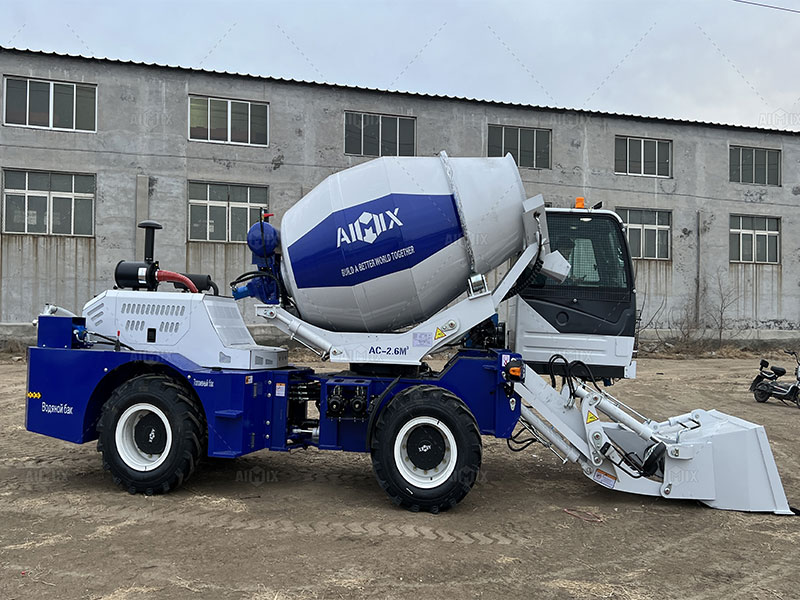Self-loading mixers have revolutionized the construction industry by combining the functions of a mixer and a loader in a single machine. To harness the full potential of these versatile tools, it is imperative to prioritize maintenance. In this article, we delve into the essential practices of self-loading mixer maintenance that are crucial for ensuring optimal performance on construction sites.
Regular Inspection Routine:
The cornerstone of effective maintenance lies in a consistent and thorough inspection routine. Regularly examine all components of the self loading mixers, including the hydraulic system, engine, mixing drum, and controls. Detecting issues early on allows for prompt intervention, preventing potential breakdowns and ensuring uninterrupted operation.
Lubrication is Key:
Proper lubrication is the lifeblood of any heavy machinery. Ensure that all moving parts, such as joints, bearings, and the mixing drum, are well-lubricated. Regularly check and replenish lubricants according to the manufacturer’s specifications. Adequate lubrication minimizes friction, reduces wear and tear, and extends the lifespan of critical components.
Hydraulic System Maintenance:
The hydraulic system is the heart of a self-loading mixer, responsible for powering the loader and controlling the drum. Regularly check hydraulic fluid levels and quality, and promptly address any leaks. Clean hydraulic filters and replace them as recommended. A well-maintained hydraulic system ensures smooth operation and efficient performance.
Inspecting the Mixing Drum:
The mixing drum is subjected to constant wear during operation. Inspect it regularly for signs of damage, such as cracks or excessive wear on the blades. Ensure that the drum is balanced to avoid vibrations that could lead to mechanical issues. Proper maintenance of the mixing drum directly impacts the quality of the mixed concrete.
Electrical System Check:
Modern self-loading mixers often feature advanced control systems. Regularly inspect the electrical components, including wiring, sensors, and the control panel. Ensure that connections are secure, and address any issues with the electrical system promptly. A well-maintained electrical system is crucial for precision in operation.
Tire Maintenance:
The tires of a self-loading mixer are essential for mobility on construction sites. Regularly check tire pressure, inspect for damage, and rotate tires as recommended by the manufacturer. Proper tire maintenance ensures stability, traction, and overall safety during operation.
Battery Care:
The battery is a critical component for starting the engine and powering the electrical systems. Keep the battery terminals clean, check the electrolyte levels, and ensure that the charging system is functioning correctly. Regular battery maintenance prevents unexpected breakdowns and ensures reliable starts.
Cleaning and Preventing Corrosion:
Construction sites can be harsh environments, and exposure to dirt, debris, and corrosive materials can impact the longevity of a self loading mobile concrete mixer. Regularly clean the machine, paying attention to areas prone to accumulation of material. Apply protective coatings or corrosion inhibitors to vulnerable components.
Operator Training and Awareness:
Maintenance is not solely the responsibility of the maintenance team; operators play a crucial role. Provide comprehensive training to operators on daily checks, recognizing warning signs, and reporting issues promptly. Operator awareness contributes to early detection and a proactive approach to maintenance.
Adhering to Manufacturer Guidelines:
Last but not least, always adhere to the manufacturer’s maintenance guidelines and recommendations. Follow the prescribed service intervals, use recommended replacement parts, and consult the manual for troubleshooting. Manufacturers provide these guidelines based on extensive testing and expertise, ensuring optimal performance and longevity.
Conclusion:
Mastering the maintenance of self-loading mixers is paramount for ensuring optimal performance, extending lifespan, and maximizing return on investment. A proactive approach to inspection, lubrication, and care for critical components will not only prevent costly downtime but also contribute to a safer and more efficient construction site. By embracing the principles of self-loading mixer maintenance, construction professionals can truly master these innovative machines and unlock their full potential on the job.


Comments
No comments yet. Be the first to react!